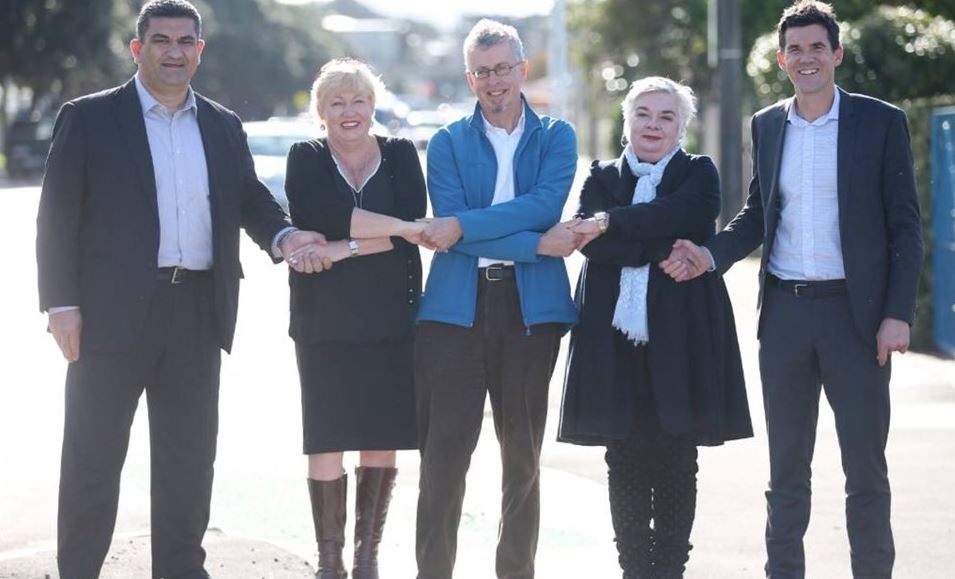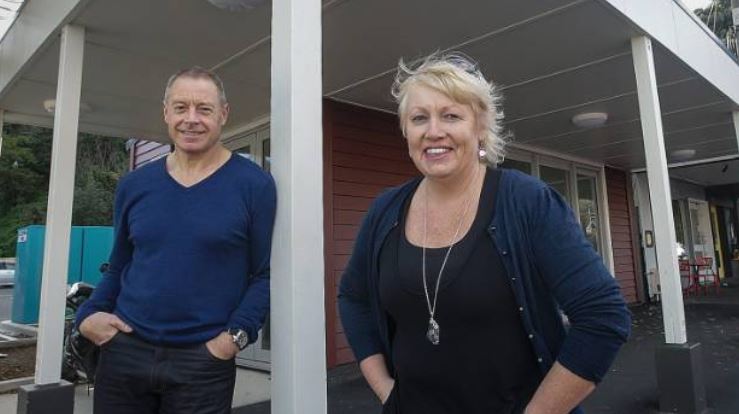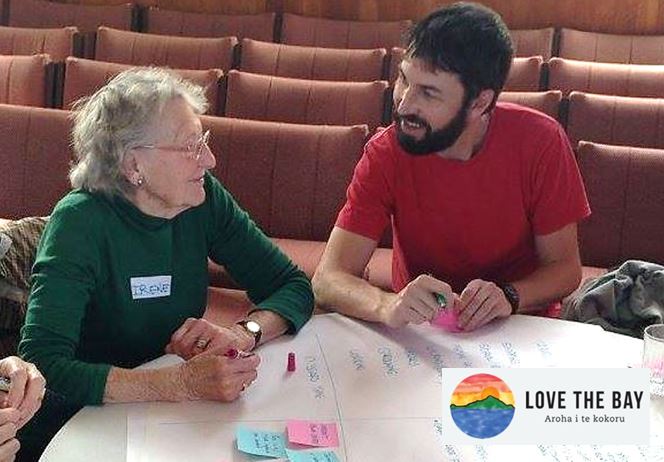“Community desires” and the vital dullness of process
Imagine a well-intentioned initiative to make your local main street safer. Fast forward through a messy process, and now a local group’s taking Council to court over it all. What’s going on – and more importantly, would this happen to something good but messy in your suburb?
Yesterday and today, the Island Bay Residents’ Association is in court with Wellington City Council, seeking judicial review of the decision to implement a parking-protected cycleway along The Parade, Island Bay.
I like the idea of nicer safer streets, but I don’t live in Island Bay. Relevant?
Sure there’s plenty to feed that “local drama” voyeurism. But this really matters for you if you have any desire to see your streets more hospitable for people.
Why?
In almost all Wellington region urban streets, “more hospitable for people” = “less hospitable to cars”. It’s physics and economics: physics of the human body, physics of space between buildings, and economics of using scarce common resources (that road corridor space).
So you need to pay attention to Island Bay if you have any desire to see anything in your ‘hood like… slower traffic, more generous footpaths, bus priority (or for any kind of public transport), safer everyday cycling, more crossable roads (esp for old, impaired or young people), more street trees or art or seating, etc etc.
Because thanks to how Kiwis have been designing and building streets, all these good things will involve “an attack on driving”, AKA making it a bit less convenient or a bit slower to drive or park there. (Or they might just feel like they do, even if the impact is so small as to be undetectable.)
So unless you’re really sure that your suburb doesn’t have the particular mix of characteristics that have contributed to things going septic in Island Bay, we’d suggest you pay attention to this issue.
Cognisant of all this, the media have been covering the IBRA’s court hearing.
Stuff’s coverage is in part one and two; RNZ’s here.
The most enlightening reading we’ve found, about what it actually means to get judicial review of a council decision, and what that involves for the community group (and the ratepayers) is below.
It’s from this time last year, when the Residents’ Association announced they were going to try for judicial review (and then subsequently started fundraising). What’s interesting is that it’s written by Regan Dooley, Island Bay local and careful documenter of the whole process. For four-plus years now he’s been even-handedly calling out both the shortcomings and strengths – of the process, the physical design, the discourse, the strategies – and doing so strictly evidence-based in everything he says.
We reckon this is a huge contribution because regardless of whether you agree with him on everything, clear-eyed writing and evidence helps everyone have informed opinions. This is especially important in a climate that’s been generally feverish, frequently featured lots of “alternative facts”, and has occasionally been downright disgusting. (And in which the regular media have been often overtly stirring.)
Like many Island Bay folks Dooley is a supporter of making The Parade safe for ordinary people – and especially kids – to cycle on, so it’s surprising to read this…
Why I support the judicial review
Here’s why the judicial review of the cycleway is an absolutely terrible idea that I support anyway
As recently reported in the Dominion Post Wellington City Council has received a letter from a lawyer acting for the Island Bay Residents Association (IBRA), indicating the group intends to take judicial review proceedings over the Island Bay Cycleway. Basically, IBRA want to take the council to court because, in IBRA President Vicki Greco’s words, “the community is not happy with the final outcome”. Ms Greco told Radio New Zealand that she could not comment on the details of any legal proceedings but that “the community had been totally ignored throughout the entire process – despite being clear about what it wanted to have happen”.
What’s a judicial review?
A judicial review is a legal test of the decision-making process of a public body and whether the decision-maker went outside their legal powers in making the decision. Usually the judge will focus on whether the decision-maker followed the process set down in law for making the decision. There’s a good explanation of what’s involved in a judicial review on the Community Law website. The most important thing to understand is:
“The judge usually won’t look at whether the decision-maker made the “right” decision, but will look instead at the way the decision was made – for example, whether you were given the chance to put your case, and whether the decision-maker considered all the relevant factors. The court’s role isn’t to substitute its own decision for that of the relevant agency or official, rather it’s to make sure the decision-maker acted within their legal powers – in particular, that they followed the process that the law requires.”
Even if IBRA’s legal challenge is ‘successful’ the court won’t make a new or different decision:
“The judge won’t be able to change the decision just because they would have made a different decision if it had been up to them originally. And even if the judge does cancel the original decision, they may simply send the issue back to the original decision-maker for them to make a fresh decision – the decision-maker could then just make the same decision after correcting any problems with their process that the judge identified.”

A court can’t make WCC put the cycleway back on the road but it can tell them to re-consider their decision
Can IBRA win?
As pointed out to the Dominion Post by Southern Ward councillor Fleur Fitzsimons, IBRA has the right to test the legality of the decision-making around the cycleway. However, as noted by ex-Southern Ward councillor Paul Eagle, we’ve been here before. “IBRA had previously sought legal advice on a judicial review and were told it would be expensive and not the right process to get the right outcome, he said. He was surprised the group had decided to go down the same route”.
IBRA’s position seems to be based almost entirely on the belief that consultation with the community is the only thing that council should have taken into account and that having consulted the council has not done ‘what the community wanted’. In Vicki Greco’s own words “the community is not happy with the final outcome”. Setting aside the fact that it’s questionable how much of the community IBRA actually represent, the admission that it’s the outcome that IBRA are really unhappy about is a big problem for them. The court will only be interested in the process, not the outcome.

Another problem for IBRA is that since the last time they investigated the judicial review option there’s been the Love the Bay process. This was a long and expensive consultation process that included setting up a pop-up shop and four rounds of workshops. The process will more than satisfy the council’s legal obligation to consult. The Love the Bay process was set up in direct response to IBRA’s concerns and they were also part of the governing syndicate. The sweeping statement about “the community being totally ignored throughout the entire process” is demonstrably untrue and the council’s lawyers will have no problem proving that in court. The fact that it was IBRA who also demanded the Love the Bay process be prematurely ended won’t look good in court either.

The council (and the court) will also put much greater weight on “whether the decision-maker considered all the relevant factors” than IBRA are doing. For example, Tonkin & Taylor’s post-consultation design report made it clear that roadside bike lanes were not a suitable option for The Parade because they did not conform with NZTA and other international guidance on when separated cycleways are appropriate. IBRA might want to play-down the relevance of that but the court won’t. In fact, if the court criticises the council for anything it might be that the roadside Option A (and its bastard child Option E) never should have been considered in the decision-making at all. Don’t forget that the only reason Option A was even in Tonkin & Taylor’s report was because councillors insisted that “an option similar to the original layout” should be included. That’s the kind of political interference in the process that councillors were warned to stay away from in Morrison Low’s review of Wellington City Council’s Urban Cycleways Programme.
If the advice that IBRA received back in 2015 was that a judicial review was not the right way to proceed it’s even more likely to be the advice they get now.
So why are they going ahead?
It’s a good question. An article in the Cook Strait News (page 10) sheds some light on what IBRA’s real motivation for seeking a judicial review might be. In the IBRA President’s own words their preferred outcome is that the council “settles with IBRA out of court”. So what IBRA seem to be doing is asking for a judicial review of a decision-making process as a tactic to force the council into negotiations with them (nobody else) about re-litigating the same decision-making process. If that’s the case it’s not only undemocratic but hypocritical. The council can’t and won’t come to any kind of behind-closed-doors agreement with IBRA to change a decision that was made by a 13-1 majority of councillors. If they did it would (ironically) leave them exposed to a new Ombudsman’s complaint or judicial review about a lack of proper process, and one that is far more likely to succeed.
It’s quite surprising that IBRA would so blatantly show their hand like this. IBRA have a democratic and legal right to seek a judicial review but the council should absolutely call IBRA’s bluff and say “ok then, see you in court”. If it does get to court the fact that IBRA have made their motives so clear will count against them. It’s obvious that IBRA don’t really think they can win and the court won’t appreciate being used as a bargaining chip. It will also affect the council’s and the court’s thinking around costs. Citizens should be able to test the legality of council decision-making without the fear of huge awards of costs against them but this situation is different. There’s already been a long and expensive consultation process and IBRA are being quite open about using the threat of a judicial review as a negotiating tactic. If it somehow gets to court that makes the review itself look vexatious. The council should seek to recover costs and the court should award them.

There’s also questions about IBRA’s fundraising towards the cost of the review. If the review gets all the way to court it is highly unlikely it will be successful and highly unlikely that anybody who donates will get any money back. In fact, an award of costs against IBRA could bankrupt them, although as an incorporated society no-one will be personally liable. If IBRA don’t have any real intention of going to court then I don’t think they have made that anywhere near clear enough in their request for donations. It’s also not clear what will happen to any left-over money they’ve collected. When questioned about this on their Facebook page the replies from the page admin have ranged from evasive to antagonistic. Unlike the last attempt at a judicial review they are asking for donations directly into a bank account rather than a Givealittle page, which just adds to the sense of a lack of transparency.
I’m an IBRA member (I’m on their mailing list at least) so I also know that the committee did not consult with the wider membership on this. There was no indication at all via email or Facebook about what they were thinking although it may have been discussed at the two meetings they have held since their AGM back in October 2017 (I did not attend either of the meetings in February 2018 & April 2018). In reality the strategy of seeking a judicial review was agreed by the dozen or so members of the IBRA committee & then (maybe) endorsed by the 50 or so members they usually get to their meetings. Which is ironic when a perceived lack of proper consultation is a major part of their ongoing beef with the council.
Why I support the judicial review
Funnily enough, getting more clarity about IBRA’s rather dubious motives for seeking a judicial review makes me feel quite supportive of it actually getting to court. That would be much more transparent and democratic than any kind of out of court ‘settlement’. It would also bring a much needed conclusion to the whole saga and I’m quite confident about what the outcome will be – the court will confirm that the consultation process met legal requirements and take no further action. I just hope that IBRA and anyone donating to their cause know what they are getting themselves into.
Regan
24 May: This post has been updated to include the correct link to questions and answers on IBRA’s Facebook page about how the review is being funded.
[TW Editor’s note: the link to a later post (final paragraph) was added by Talk Wellington for readers’ convenience.]
This post was originally posted on Island Bay Healthy Streets, and is reproduced with permission.
Read more:
- One example of pretty shameful stirring by Stuff reporters, and a rundown on what they decided to leave out of that article. Exhibit A for the value of evidence-based local blogging!
- Bikelash, or what it is about changing streets for safer cycling that gets otherwise ordinary people so irate. (Actual paper here, a very readable read) [1.1MB PDF]
Thanks for this! That paper you link to right at the end is especially interesting, and mirrors my own experience of what causes people (OK, me) to get riled up about transport projects, in addition to their ‘objective’ benefits or disbenefits. Transport projects that fail to treat people as people (individuals and current or potential social actors) rather than statistics tend to run into trouble: those of us who want low-carbon transport projects to flourish need to get much better at recognising and acting on that.
The section about the relationship between urbanism and gentrification seemed especially cogent to me.
Cheers Tim, There’s a lot of smart insight out there for sure